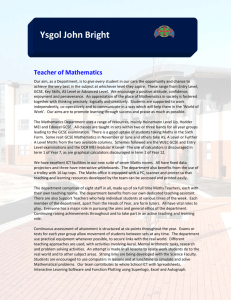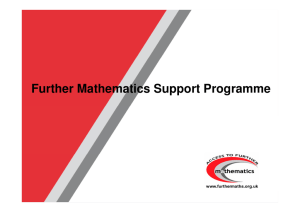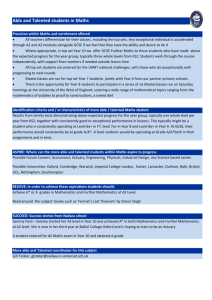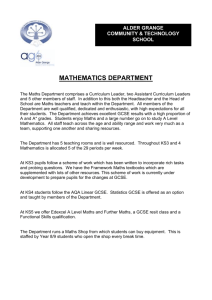MEI Newsletter From the Chief Executive Mathematics in Education and Industry December 2015
advertisement
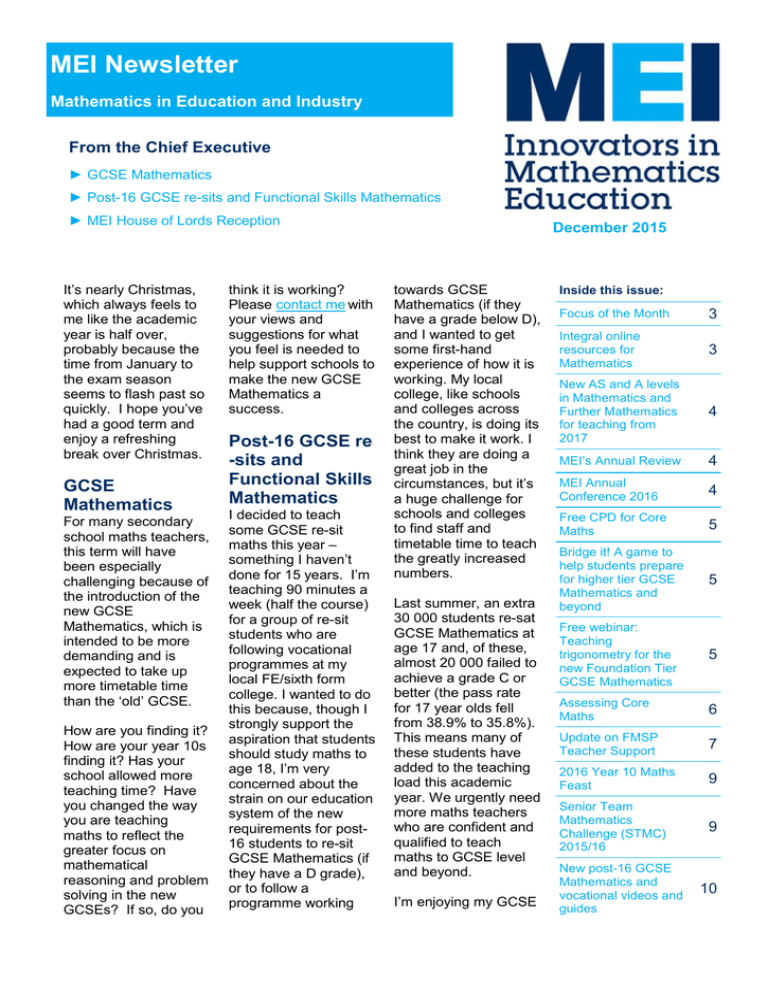
MEI Newsletter Mathematics in Education and Industry From the Chief Executive ► GCSE Mathematics ► Post-16 GCSE re-sits and Functional Skills Mathematics ► MEI House of Lords Reception It’s nearly Christmas, which always feels to me like the academic year is half over, probably because the time from January to the exam season seems to flash past so quickly. I hope you’ve had a good term and enjoy a refreshing break over Christmas. GCSE Mathematics For many secondary school maths teachers, this term will have been especially challenging because of the introduction of the new GCSE Mathematics, which is intended to be more demanding and is expected to take up more timetable time than the ‘old’ GCSE. How are you finding it? How are your year 10s finding it? Has your school allowed more teaching time? Have you changed the way you are teaching maths to reflect the greater focus on mathematical reasoning and problem solving in the new GCSEs? If so, do you think it is working? Please contact me with your views and suggestions for what you feel is needed to help support schools to make the new GCSE Mathematics a success. Post-16 GCSE re -sits and Functional Skills Mathematics I decided to teach some GCSE re-sit maths this year – something I haven’t done for 15 years. I’m teaching 90 minutes a week (half the course) for a group of re-sit students who are following vocational programmes at my local FE/sixth form college. I wanted to do this because, though I strongly support the aspiration that students should study maths to age 18, I’m very concerned about the strain on our education system of the new requirements for post16 students to re-sit GCSE Mathematics (if they have a D grade), or to follow a programme working December 2015 towards GCSE Mathematics (if they have a grade below D), and I wanted to get some first-hand experience of how it is working. My local college, like schools and colleges across the country, is doing its best to make it work. I think they are doing a great job in the circumstances, but it’s a huge challenge for schools and colleges to find staff and timetable time to teach the greatly increased numbers. Last summer, an extra 30 000 students re-sat GCSE Mathematics at age 17 and, of these, almost 20 000 failed to achieve a grade C or better (the pass rate for 17 year olds fell from 38.9% to 35.8%). This means many of these students have added to the teaching load this academic year. We urgently need more maths teachers who are confident and qualified to teach maths to GCSE level and beyond. I’m enjoying my GCSE Inside this issue: Focus of the Month 3 Integral online resources for Mathematics 3 New AS and A levels in Mathematics and Further Mathematics for teaching from 2017 4 MEI’s Annual Review 4 MEI Annual Conference 2016 4 Free CPD for Core Maths 5 Bridge it! A game to help students prepare for higher tier GCSE Mathematics and beyond 5 Free webinar: Teaching trigonometry for the new Foundation Tier GCSE Mathematics 5 Assessing Core Maths 6 Update on FMSP Teacher Support 7 2016 Year 10 Maths Feast 9 Senior Team Mathematics Challenge (STMC) 2015/16 9 New post-16 GCSE Mathematics and vocational videos and guides 10 Page 2 December 2015 re-sit teaching, and the students seem to be responding quite well so far, though they have a long way to go. Students who achieve a grade D at the end of year 11 were often involved in special programmes at school to help them achieve a grade C. Unfortunately, this is not the same goal as developing a sustainable understanding of GCSE level maths. A big issue for me is whether the current focus on re-sitting GCSE Mathematics is the best option. I want the students to receive the most useful possible maths education for them, enabling them to use maths confidently and effectively in life and work. I fear most re-sit students see GCSE Mathematics only as an examination hurdle, they don’t think about the usefulness of maths itself. I suspect re-sitting an examination they have already failed and that is focused partly on maths needed for further study in academic subjects, often serves only to reinforce their negative views of maths. Functional Skills Mathematics qualifications are to be revised. If this is done well, I believe it could be a far better option for many of the tens of thousands of GCSE resit students. However, it’s not just the content of the qualification that must be right; it must be recognised fully by employers, so that, for vocational students, a pass in Functional Skills Mathematics has equal status with a pass in GCSE Mathematics. As long as having at least a grade C in GCSE Mathematics and English is used as a crude first filter for job applicants, re-sitting GCSE Mathematics will remain the best option for these students, even if it does not address their mathematical needs. An alternative could be to develop a new post16 GCSE Mathematics, tailored to the needs of vocational students. This could be based on a subset of the new GCSE content, with a maximum grade of 5 on the new 9-point scale. I’d be interested to hear your views on this. MEI House of Lords reception On 11 November, MEI held a reception at the House of Lords, hosted by Lord Broers. The theme was how to support increased participation and achievement in maths education post-16. Influential guests were invited from a range of backgrounds, including interested members of both Houses of Parliament and representatives from industry, professional bodies, institutes of higher education, and others with an interest in improving maths education. The event was very well attended and provided a lively forum in which to raise and discuss the issues. MEI’s key messages at the event were: Mathematics – the gains over the last 10 years have been a great success and must not be put at risk. Speeches from the reception can be accessed here. ► Please encourage all young people, especially girls, to take the most demanding maths programme they can post-16. This will ensure they are well equipped for a successful future. ► Please support our call for increased support for the recruitment and development of maths teachers – the scale of the changes, and the importance of the vision, mean more investment is needed. ► Please support our call to ensure A level funding changes do not have a negative effect on the uptake of AS/A level Further Charlie Stripp Chief Executive Email Charlie Page 3 MEI Newsletter Focus of the Month Since September we’ve been running a regular ‘Focus of the Month’ item on the Home pages of the MEI and FMSP websites. These highlight topical areas of interest and provide a handy summary of all the things we offer that can support you with them. For December, the focus is on Technology. Previous topics have been: ► A level resources ► Sixth Form open evenings ► Key Stage 3 and 4 Integral online resources for Mathematics Work continues to bring exciting new resources to Integral. The latest additions include new Walkthroughs for Further Pure 1 and new exercises for Core 2. You can get updates on all the new content by following Integral on Twitter @Integral_Maths. We’ll also be highlighting particular teaching resources available in Integral via Twitter and from the integral homepage integralmaths.org. Integral is being prepared for the new A levels in Mathematics and Further Mathematics - look out for announcements in 2016. Puzzles from ‘Sumaze!’, MEI’s new, free, problem-solving app have also been added to Integral. Sumaze! reached number 5 in the new free Education apps chart for Google Play. Following the great feedback for Sumaze! we’ve introduced a new ‘Sumaze of the Week’ feature, accessible from the Integral homepage. You can find past editions of MEI’s Focus of the Month here. The FMSP website has a similar focus feature – in some months it will cover the same theme as MEI, for others it will have a different focus. You can find past editions here. Please let us know what you think of this idea. Do you have any suggestions for future themes? To get more information about Integral and to view samples, visit integralmaths.org. Janice Richards Programme Leader (Business Development and Communications) Email Janice Integral will be at BETT show The world’s leading education technology event Stand F61 If you haven’t played Sumaze!, please pick it up for free for Android devices or iPad/iPhone from Google Play or the App Store. Excel, London 20-23 January 2016 Visit the Integral team there for demonstrations and the latest information Richard Lissaman Online Resources Coordinator Email Richard Click here for more information Page 4 December 2015 New AS and A levels in Mathematics and Further Mathematics for teaching from 2017 Ofqual has published its ‘A level Mathematics Working Group Report’, together with a consultation on the assessment objectives for the new mathematics A levels. The report deals with problem solving, modelling and the use of large data sets in MEI’s Annual Review MEI’s annual review for 2014-15 is now available on our website, and printed copies are available on request. The annual review provides a useful summary of the maths education environment, together with some of MEI’s many highlights of the year. There are lots of the new A levels. MEI will be responding to the consultation but please respond yourselves too. new specifications, developing new textbooks and new Integral online resources. We are continuing development of new MEI AS and A levels in Mathematics and Further Mathematics and, subject to Ofqual’s timetable, we expect to publish draft specifications and specimen assessment materials during this academic year. We are also working on resources for teachers and students for the Thank you to those of you who have provided feedback on our A level development work through the survey, and to those who have trialled questions with your students. This has been hugely helpful to us in refining our thinking. If you have questions about the new mathematics A levels, or would like to trial any materials with your students, please get in touch. Stella Dudzic Programme Leader (Curriculum) Email Stella lovely photos too. Do please take a look. MEI Annual Conference 2016 Please remember to ‘save the date’ for MEI’s Annual Conference for all 11-19 maths teachers next summer, 30 June - 2 July 2016. We are already putting together a full programme of plenaries and workshops. There will be plenty for everyone, from KS3 to pre-university and working towards post16 GCSE. A key strand will focus on the new A levels in Mathematics, to help you to get up to speed for first teaching from September 2017. We look forward to seeing you there! Janice Richards Programme Leader (Business Development and Communications) Email Janice Page 5 MEI Newsletter Free CPD for Core Maths There are still places available at free OCR organised training events for the OCR/ MEI Core Maths qualifications. Core Maths Training event: This morning event has the following aims: ► To introduce the two OCR(MEI) Core Bridge It! A game to help students prepare for higher tier GCSE Mathematics and beyond Bridge It! is a quiz game with questions to test basic skills, through to multi-step problems. This game is suitable for anyone progressing to postGCSE maths (or those preparing for higher tier GCSE Mathematics) for Maths qualifications and enable teachers to understand the relationships between them. ► To outline some models for delivering the qualifications in a school/college. ► To provide an introduction to some useful, freely available, resources ► Reviewing topics from GCSE Mathematics ► Strengthening skills from GCSE Mathematics to get ready for the next level Core Maths Problem Solving event: This afternoon event has the following aims: ► To familiarise teachers with the problem solving cycles used in the OCR(MEI) Core Maths qualifications. ► To build teacher assessment of A level Mathematics from 2017. confidence in teaching through problem solving in Core Maths. ► To provide an introduction to some relevant problems which can be used in teaching Core Maths. It is possible to go to both events at the same venue on the same day. Book via the OCR CPD hub Bridge It! is available free of charge for trialling in beta version at mei.org.uk/bridgeit The game contains 230 questions covering 22 topics, including: ► sorting and matching ► Developing deeper problem-solving skills demanded at post-GCSE level. ► drag’n’drop geometry ► a problem-solving These skills will be emphasised in the finale. Stella Dudzic Programme Leader (Curriculum) Email Stella for teaching it. The webinar is scheduled for 16:00-16:45, on Thursday 21st January 2016. Free webinar: Teaching trigonometry for the new Foundation Tier GCSE Mathematics Trigonometry is one of the new topics included in the for teaching the qualifications. Please register here if you would like to attend. foundation tier. MEI is offering a free webinar providing some ideas Katharine Davies MEI Curriculum Resource Developer Email Katharine Page 6 December 2015 Assessing Core Maths Most schools and colleges have systems in place for gathering, monitoring and responding to estimated examination grades. As so much for schools, colleges, students and teachers, depends on final examination grades, it is important that this information is as accurate as possible. With existing qualifications, most schools/colleges have robust systems in place, using a combination of teacher experience and past examination papers, but this is more difficult for a new qualification like Core Maths. As the qualification becomes more established and teacher experience grows, the established systems will work, but for the moment a different approach is needed. This presents an opportunity to make creative use of formative assessment methods and approaches. Formative assessment, if used correctly, should provide a detailed picture of how students are developing their mathematical understanding in lessons. It can be used instead of grade based assessment for monitoring purposes (see Black and Wiliam). The information can be useful in several ways, for example: examples are given below. The results of these discussions could form the basis for brief entries in a learning log. ► Planning future lessons to maximise student learning ► Giving feedback to students which will help them to develop as problem solvers (see the work of Carol Dweck on mindset) ► Developing a picture of how individual students are progressing. The PRIMAS project website has some interesting suggestions about how to get the most from peer and self-assessment, including a video clip (on this page) where a class assess and rank some answers to a problem, then share their opinions to develop an understanding of what a good solution looks like. There are some downloads on the same page which give useful further information. Reflecting on learning can be encouraged by using diagrams and other discussion prompts. A few Short assessment tasks can be used, and example solutions discussed, to help students develop an understanding of what makes a good solution. It could be argued that the most accurate indication of a student’s final examination grade is the one obtained from a closely simulated examination. For example, a past examination paper which is unfamiliar to the students, near to the time of the examination, using the exam board mark scheme and grade boundaries. The closest Core Maths students can get to this at the moment is using a specimen examination paper, with predicted grade boundaries. There may also be practice papers available for this purpose. However, teachers will want to leave these papers until close to the end of the course, making use of formative assessment during the course. The MEI Core Maths resources, which are available from our website after completing the form for a free subscription, contain section tests which are automatically marked online and will help to track student progress. Terry Dawson Curriculum Developer Email Terry Page 7 MEI Newsletter Update on FMSP Teacher Support A key aim of the Further Mathematics Support Programme (FMSP) is to support teachers in schools and to contribute to their continuing professional development. Last academic year the FMSP Area Coordinators ran almost 200 events for teachers for GCSE Mathematics, A level Mathematics and A level Further Mathematics, which were attended by over 2000 teachers across England. As well as the support offered by the local FMSP Area Coordinators, the FMSP central team coordinates an extensive programme of online professional development and Teaching Further Mathematics, an extended course which attracted over 150 applicants last year. We have developed two new extended courses, Teaching Mechanics and Teaching Statistics which, in addition to providing subject knowledge enhancement, will support teachers with the transition to the new Mathematics and Further Mathematics A levels being introduced for first teaching from September 2017. The Teaching Mechanics programme has a group starting early in 2016 and is now open for applications: Teaching Mechanics 1 (TM1) TM1 is an extended course for teachers wishing to develop their subject knowledge and classroom practice in teaching the Mechanics modules in A level Mathematics and Further Mathematics. TM1 covers the content of all the M1 and some of the M2 material of the four English examination specifications and will also prepare teachers for the compulsory mechanics in the new Mathematics A level starting in 2017. The course aims to enable participants to: tutorials, 2 face-to-face study days, dedicated web-based course resources and support from the course tutors. TM1 will run from February to July 2016 and is now open for applications. You can get full details and a link to the application form at furthermaths.org.uk/ teaching-mechanics TM1 can also be studied as part of a Masters programme, accredited by Plymouth University. ► gain a deep understanding of the content of the Mechanics units ► develop skills with mathematical modelling and problem solving ► develop confidence with incorporating practical work within maths teaching ► be able to link topics in Mechanics with other areas of maths Teaching Further Mathematics (TFM) TFM is an extended professional development course for teachers wishing to develop their own subject knowledge and classroom practice in teaching A level Further Mathematics. ► There are two units: TFM1 and TFM2. It is possible to enrol on TFM1 only ► Each unit is The course includes 10 scheduled live online scheduled over a 7 month period and Page 8 December 2015 includes 10 scheduled live online tutorials (in the evenings), 2 face-to-face study days (on Saturdays) and dedicated webbased course resources For more details see: furthermaths.org.uk/tfm The TFM1 unit is next scheduled to start in January 2016. Here are just a few of the comments from teachers who have enrolled on the TFM course: "The course was fantastic and I have used so many of the resources" "Actually made me think about how to deliver a subject rather than just teach from the book" “TFM is the single most inspiring thing that’s having biggest impact upon my teaching this year.” Teacher Networks – the latest developments The number of FMSP teacher networks continues to grow and now exceeds 50 groups across England. These groups have become a more central part of the way we support local teachers and the venues and dates of forthcoming meetings are now listed on the regional teacher events pages on the FMSP website. An interactive map showing the location of each network, with details of the meetings and contact information so that teachers can easily find the nearest network to them, will soon be available on the FMSP Website. The teacher networks will also be the vehicle through which the FMSP will roll out a series of support meetings for the new A levels in Mathematics, using centrally created resources. The first few of these meetings have already taken place and have been very well attended and enthusiastically received. In the Spring Term of 2016, some of our networks will again be offering the popular workshops run by Rob Eastaway of Maths Inspiration, giving teachers the chance to get ideas about how to invigorate GCSE and A level lessons with problem solving and interesting contexts. See your regional page on the FMSP site for details Sue de Pomerai FMSP Deputy Programme Leader Email Sue Page 9 MEI Newsletter 2016 Year 10 Maths Feast The Maths Feast seems likely to be even more popular than last year. This competition is run for teams of Year 10 students and is designed to test their mathematical problem solving, communication and team work skills. There are over 80 venues Senior Team Mathematics Challenge (STMC) 2015/16 The regional heats of the STMC are well under way. This is a competition organised jointly by the Further Mathematics Support Programme and the UK Mathematics Trust and sponsored by Rolls-Royce plc. Teams of four students, from years 11 to 13, tackle a series of demanding across the country ready to accept bookings from teams of four Year 10 students accompanied by their teacher (or other responsible adult). Teams are told to expect the unexpected! Last year saw teams building towers of Columbus Cubes – what will they be creating this year? To book a team into a Feast near you, go to the Maths Feast Page and use the online booking form. Cath Moore FMSP Central Coordinator (KS4 Enrichment and CPD) Email Cath mathematical challenges which focus on mathematical problem solving, teamwork and communication skills. The three rounds include group problem solving, a crossnumber puzzle and a mathematical shuttle race. The heats take place across the UK throughout November and December and enrolment this year has been at a record high with over 1200 teams signed up in over 60 locations. Competition has been fierce already with some excellent scores being achieved. The winners of each heat, together with highest scoring runners-up will go on to the national final in London on 2nd February. Paul Chillingworth FMSP Central Coordinator Email Paul Page 10 December 2015 New post-16 GCSE Mathematics and vocational videos and guides MEI recently produced a series of 27 videos to support the Education and Training Foundation’s Maths Pipeline Programme. These videos are designed for teachers of post-16 GCSE Mathematics, and also to support vocational practitioners in embedding maths in their lessons; however, many of them would also be relevant to KS3 and KS4 maths teachers. The videos are grouped into three areas and can be accessed from the PDF provided on the following webpages: Resit GCSE Mathematics These include examples of activities that can be used in the classroom, together with some worked examples of GCSE questions. Vocational These include vocational students talking about how they use maths in areas such as hairdressing, construction, catering and caring occupations, and sections of them could also be used with KS3 and KS4 students to show how the maths they are learning is used in the workplace. Secure estate These show teaching practitioners who work with offenders discussing maths teaching activities they have used. and many links to further videos and materials. They are available from the following webpages: MEI has also developed four guides to support the Education and Training Foundation’s Maths Pipeline Programme. These are designed to support vocational practitioners in embedding maths in their teaching and learning, and they include teaching ideas ► Hairdressing & ► Construction Beauty Therapy ► Health and Social Care ► Hospitality and Catering Janice Richards Programme Leader (Business Development and Communications) Email Janice Mathematics in Education and Industry Monckton House Epsom Centre White Horse Business Park Trowbridge Wiltshire BA14 0XG Phone: 01225 776776 Fax: 01225 775755 E-mail: office@mei.org.uk Company registration number: 3265490 Registered Charity Number: 1058911 Websites: MEI: mei.org.uk FMSP: furthermaths.org.uk MEI conference: conference.mei.org.uk Integral mathematics resources: integralmaths.org Facebook: facebook.com/MEIMaths Twitter: twitter.com/MEImaths twitter.com/MEIConference twitter.com/Integral_Maths About MEI Mathematics in Education and Industry (MEI) is a membership organisation and a charity. Since the 1960s, MEI has worked to support mathematics teaching and learning. Any income generated through MEI’s work is used to support mathematics education. MEI emphasises understanding and enjoyment of mathematics and also highlights the importance of mathematics in industry and commerce. MEI pioneers the development of innovative teaching and learning resources, including extensive online materials to support all major examination syllabuses. MEI offers teachers of all GCSE and A level specifications a range of continuing professional development (CPD) courses, provides specialist tuition for students and works with industry to enhance mathematical skills in the workplace. There is a network of MEI branches around the country, offering local support for teachers. MEI’s popular A level specification is administered by OCR, with MEI taking responsibility for the curriculum, and providing course textbooks published by Hodder Education. support for teachers of AS/A level Mathematics and Further Mathematics in schools and colleges throughout England. MEI manages the government-funded Further Mathematics Support Programme, providing advice and © MEI 2015
